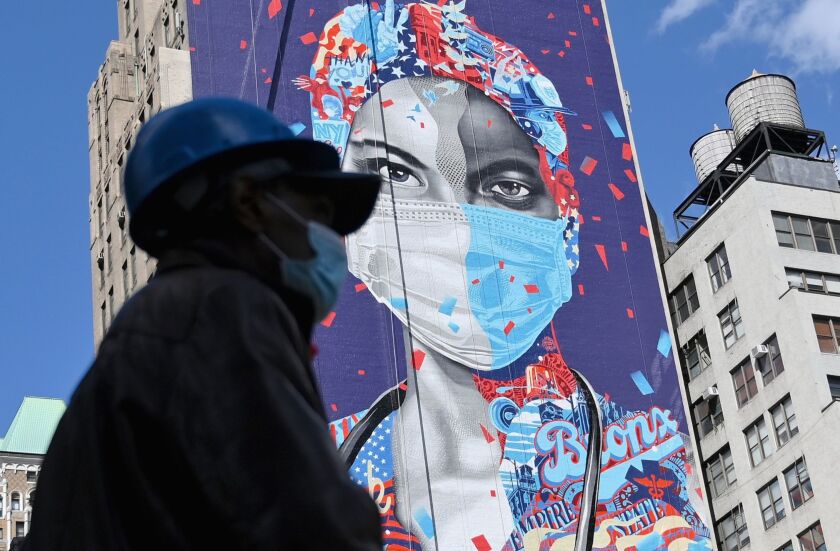Visa pulled its financial outlook for the rest of the year, but it already has visibility into permanent changes that result from the coronavirus — such as an aversion to handling cash.
"The big opportunities here are in e-commerce and cash displacement," Visa CEO Al Kelly said during Thursday's earnings call.
For the quarter ending March 31, Visa reported net income of $3.08 billion, or $1.38 per share, up from $2.98 billion or $1.31 per share the prior year. That’s better than Zacks Investment Research’s consensus analyst forecast of $1.35 per share, versus $1.31 per share in 2019. Visa reported a deterioration in spending, initially in Asia in February and globally in March. Restaurants, travel, entertainment and fuel were particularly hard hit.
“A year that looked quite promising has been substantially disrupted,” Kelly said. Visa is pulling back on discretionary spending such as travel, but it is investing in product development, technology, branding and business development, he said. “Nothing has changed about these opportunities in medium- and long-term growth.”

Visa reported the global pandemic has a high degree of uncertainty, so it did not issue a forecast for the rest of the year. The road ahead would be challenging for a number of quarters, Kelly said, but he added that the card brand would not have coronavirus-related layoffs this year. Mastercard has made a similar pledge.
The virus has accelerated moves toward e-commerce and contactless payments. Beyond the near-term economic crisis, Kelly said the broader trends are good news for Visa, given the card brand doesn’t have to compete with cash in an online or contactless environment. Visa also noted people buying items in digital channels that were “in person” purchases before the outbreak, such as furniture, electronics and apparel.
By incentivizing businesses to rehire employees laid off or furloughed due to COVID-19, states will generate a faster economic recovery and provide valuable assistance for companies to get back on their feet.
The Internal Revenue Service and the Treasury Department provided guidance to employers requiring them to report the amount of qualified sick and family leave wages they have paid to their employees under the Families First Coronavirus Response Act on Form W-2.
The Financial Accounting Standards Board released a proposed accounting standards update to help insurance companies adversely affected by the COVID-19 pandemic by giving them an extra year to implement the long-duration insurance accounting standard.
At Visa, contactless payments grew 40% over the prior year’s quarter, a similar spike to what Mastercard reported. Nine of the largest 10 global supermarket chains and nine of the 10 largest issuers have adopted contactless payments. In the U.S., card-not-present payments grew 18% in April alone, while card-present payments declined 45%.
“Merchants are turning to contactless as they seek to reduce the need for cardholders to interact,” Kelly said.
Overall, contactless payments have increased quickly during the crisis, with the relative safety of noncash transactions drawing more users. "Currency is a germ-carrying mechanism," Kelly said.
But there is substantial softness beyond the near-term drop in payments during lockdowns. People will also be reluctant to leave the country at first, so the recovery path for travel is less clear, though Kelly said it would eventually come back.
“It’s possible there could be some business travel that doesn’t come back at the same level,” Kelly said. “People have been working from home and realizing they can get done what they need to get done without travel.”
Visa has not forecast how much the growth in e-commerce spending offsets the loss of travel spending, Kelly said.
Visa’s earnings call came a day after Mastercard’s earnings announcement, during which Mastercard CEO Ajay Banga said payment flows were starting to stabilize but there’s still a lack of visibility. Mastercard pulled its forward guidance, and Banga said payments for activities such as international travel may not become robust again until next year.
In Visa’s previous earnings call, in January, Kelly sounded an early note of caution on the coronavirus, saying it could hurt travel and other payment flows if the virus spread.
Visa did report momentum during the quarter, reporting it’s signed issuing deals with several institutions, including Barclays in the U.K., Truist and TCF Bank in the U.S. and Tencent in China.
Visa on Thursday also announced a partnership with Safaricom, the Kenyan telecom that operates the MPesa mobile money service. The deal enables collaboration on digital payments as well as connecting Visa’s global merchant network in 200 nations to MPesa’s network.
MPesa has become well known as a financial inclusion catalyst in Africa, but it has broadened its reach in recent years. Late in 2019 it started a partnership with Alipay, and in 2018 MPesa teamed with Western Union, two deals that expanded its global profile.
“Our focus right now is bringing as much stability to the payments system as possible,” Kelly said.






